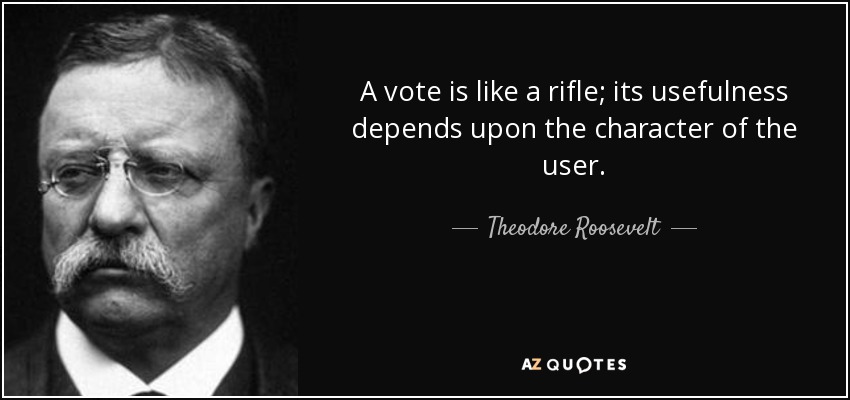A vote is like a rifle: its usefulness depends upon the character of the user
– Commonly attributed to Theodore Roosevelt.
As a means to stir reflection of this commonly used simile, I will ask one question as preface to the written work that follows. If a vote is like a rifle, and only two makes are presented for use, what is the true quality of choice? What is the quality of the American vote?
The United States Primary did not always have its current form. Reflecting Alexander Hamilton and James Madison’s musings within Federalist Papers No. 9 and No. 10, the initial two presidential nominations were overseen by the Electoral College. This can be viewed as a direct result of intrinsic distrust that the founders had in the political factions and uncertainty they had in the direction of the nation. Despite any differences, they recognized George Washington as the natural selectee, a symbol of unity for the common liberties of man. A close knit selection process and an unbeatable nominee seemed the best fit for these early years of vulnerability. Federalist Paper No. 9 titled, “The Union as a Safeguard Against Domestic Faction and Insurrection”, was penned for the purpose of characterizing a threat and suggesting a system to guard against the divisive nature of political factions, and it surely helped during this period of time. This method of control, though vital for the security in the early days of the Democratic Republic, was not fated to remain. Not but 40 years later a new system would begin to emerge, the National Convention.
A number of hurdles exist today as a result, one of which is the emergence of the political primary. The most pressing concern being the side effects of all primaries being state organized or facilitated. Everything from extra qualifications of candidacy in a primary, to the times and dates of voting, are regulated by the specific laws of each state.
§ 2-1-4 of the United States Constitution directly places a legal constraint on the time of which voting occurs in the general election, being uniform across all states.
The Congress may determine the Time of chusing [sic] the Electors, and the Day on which they shall give their Votes; which Day shall be the same throughout the United States.
In terms of election time tables, it becomes apparent that political primaries are not held to the same standard or set of laws as a general election. To reiterate, there is variance in primary election laws where uniformity exists in federal law for general elections.
In each state code, details are defined as to how each holds their respective primaries. For instance; if you observe Title 21 within the Georgia State Code, you will see that everything is covered, from different provisions on the use of various voting equipment to “Parties entitled to hold primaries”, and it all generally varies when compared to other states.
Georgia Code § 21-2-191 explicitly states:
presidential preference primary shall be held in 2012 and every four years thereafter for each political party or body which has cast for its candidates for President and Vice President in the last presidential election more than 20 percent of the total vote cast for President and Vice President in this state
For the state of Georgia, there are exclusionary laws which prohibit the occurrence of state held primaries for select political parties, laws of such form are commonplace across the U.S.
In the state of Iowa, a base percentile of previous total votes must exist to acknowledge a “political party” (See IA Code § 43.2). The State of Alabama requires a petition of signatures, totaling to 3 percent, of the total vote count in the most recent gubernatorial race. Past this, a requirement of 20 percent also exists on the county or state level. (AL Code § 17-13-40)
Through further research into state code, one can find similar laws pertaining to primaries and definitions of political parties. In an effort to direct you where to look, these states have all been listed among the worst for third party and independent candidates: Alabama, Arizona, D.C., Florida, Georgia, Hawaii, Illinois, Maine, Maryland, Massachusetts, Montana, New Hampshire, New Mexico, North Carolina, North Dakota, Oklahoma, Pennsylvania, South Dakota, and Texas.
This list is composed of states among the toughest in respect to ballot access laws within the United States. These are not the only instances of troublesome hurdles and exclusionary tactics in our election system. (Be on the lookout for a new article, Influence of the FEC on Political Elections, soon)
Countless material excludes third parties and their respective candidates from proper representation; not only are they excluded from a state funded and organized event but also from what is considered to be a vital part of our election process, the political primary. So I ask again:
If a vote is like a rifle, and only two makes are presented for use, what is the true quality of choice? What is the quality of the American vote?
Image in header from AZQuotes.

